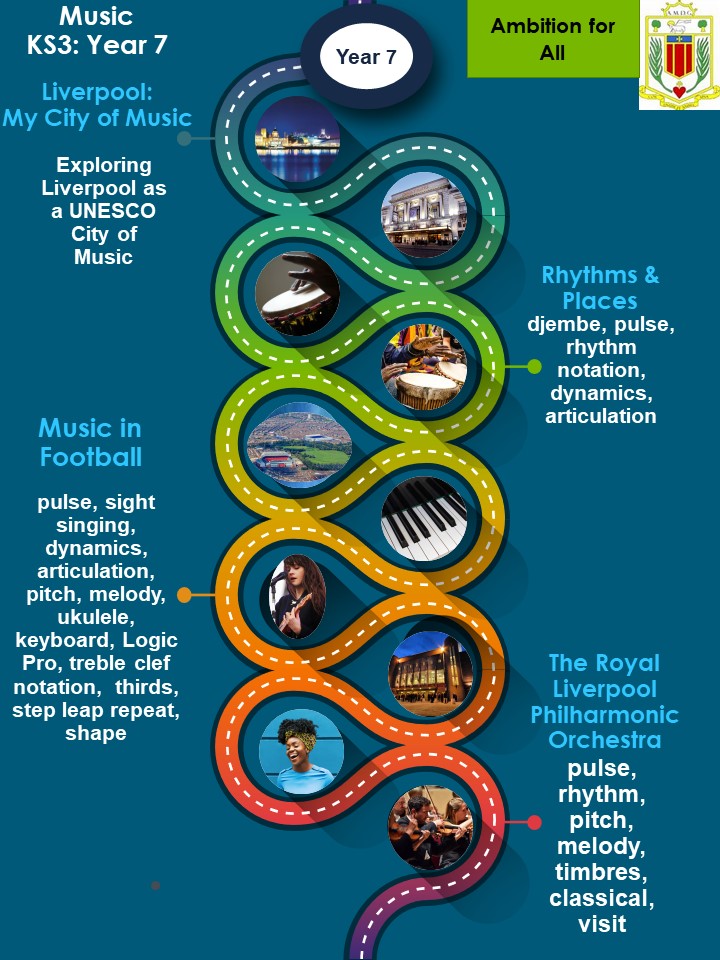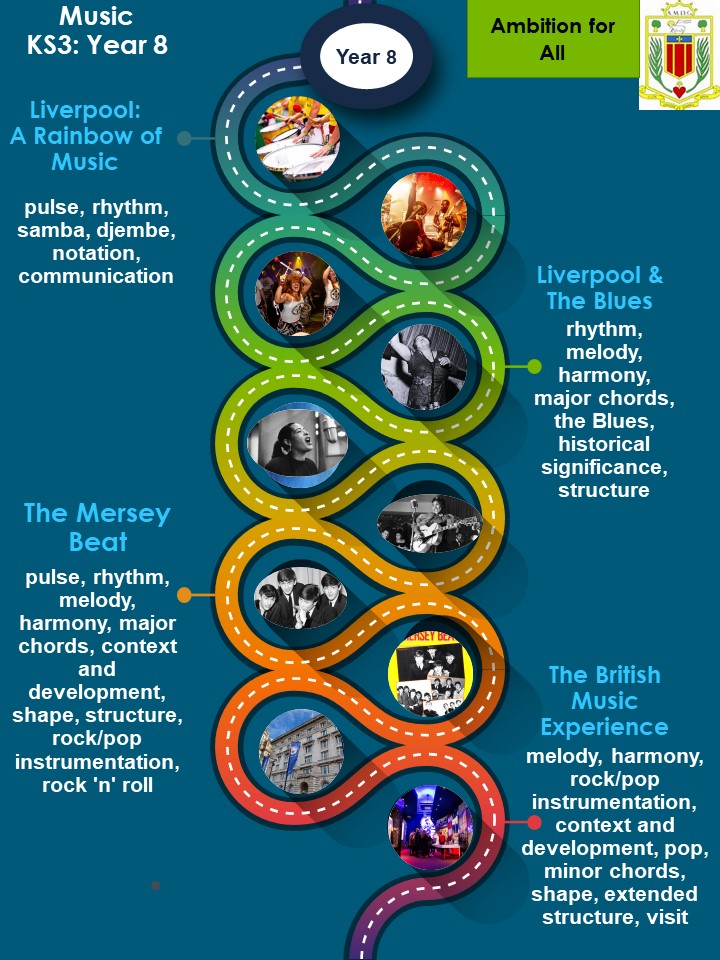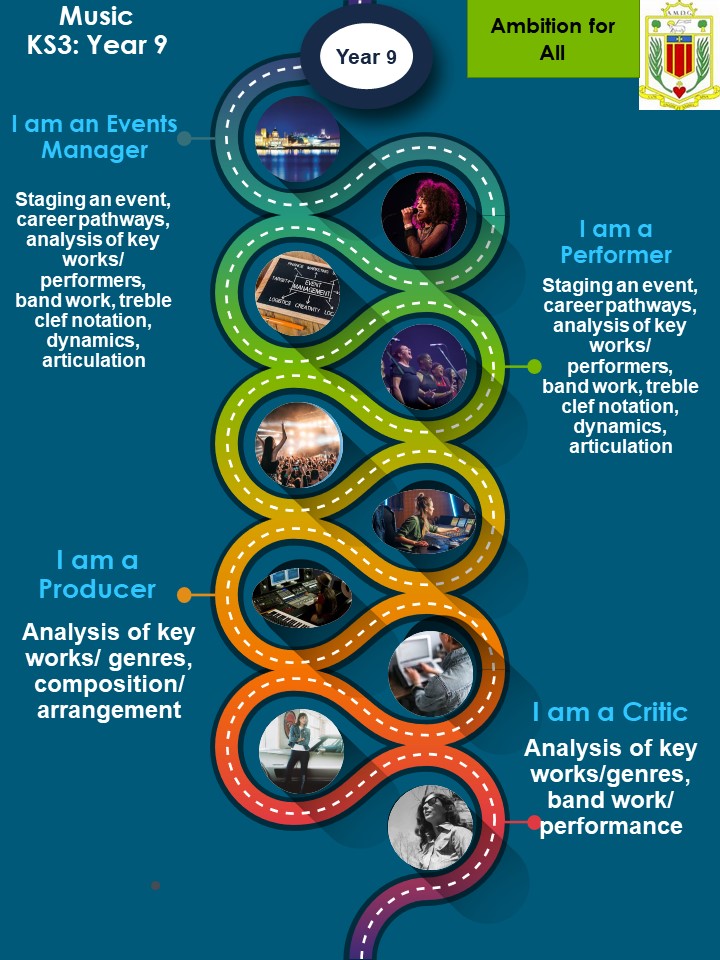Introduction
Music, once admitted to the soul, becomes a sort of spirit, and never dies
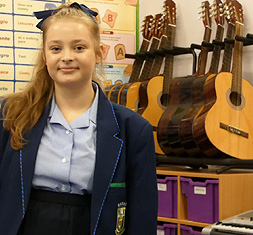 Music's significance in our lives and memories is undeniable. It is integral to many aspects of our lives, including celebrating our Catholic faith. For many, it's an expressive outlet they can't be without; for some, it's a career choice that fulfils that most sought after of life aspirations: doing something one loves and being paid for it!
Music's significance in our lives and memories is undeniable. It is integral to many aspects of our lives, including celebrating our Catholic faith. For many, it's an expressive outlet they can't be without; for some, it's a career choice that fulfils that most sought after of life aspirations: doing something one loves and being paid for it!
We believe passionately in the God-given talent and potential of each individual. Our work to help young people unlock and explore their musicality and creative expression exemplifies this. We're committed to ensuring they have opportunities to experience, explore and understand music through an enriching and challenging curriculum which empowers students as performers, creators and appreciators. Everything we do is motivated by celebrating your child's uniqueness and helping them be the best they can be.
Broughton Hall's KS3 Music curriculum is designed to nurture and celebrate each student's capacity for creativity, expression and mutual appreciation. We do this by exploring the musical heritage and opportunities in our home city, Liverpool, while understanding its place in and connections to the world stage: from worship in our city's Metropolitan Cathedral to hosting the Eurovision Song Contest. Our curriculum is underpinned by high expectations, expert teaching and the relentless pursuit of excellence shared by all good musicians. Through the key National Curriculum areas of performing, composing and listening, we focus on the fulfilment of each individual's musical potential. Carefully scaffolded, sequenced and varied activities build practical musical skills while extending, deepening and applying academic and contextual knowledge.
We encourage and empower students as performers, creators and appreciative audience members, building awareness of their own impact and the important contribution each individual makes to the whole. Through studying Music at Broughton Hall, confidence, awareness and proficiency builds. Our consideration of our locality's musical heritage makes us more mindful of our place in society and appreciative of the rich, multicultural society in which we live. The skills, attributes and knowledge we gain prepare us for lives which are, we hope, rich and rewarding, enabling us to contribute to our communities, elevate ourselves and others and take advantage of the many opportunities music presents us.
Our Aims:
- Celebrate the unique gifts of each and every student.
- Inspire our students through the provision of engaging and challenging musical experiences.
- Equip students with the knowledge, understanding and skills required to perform, create and appreciate music.
- Enrich students' lives through the power of music, raising their awareness of cultural contexts and maximising access for them personally and professionally, in the present and beyond.
Extra-curriculum
We are proud of the quality of our extra curricular provision, including our Music Tuition service and choirs. In a spirit of charity and service, our students perform at numerous school and community events throughout the year, including concerts, competitions, faith services, community events and special occasions.
Staff
Ms S. Hayes - Head of Department, Choir Leader
Ms A. Pearson - Teacher of Music, Band Leader
Mr H. Tonks - Guitar Tutor
Miss J. Hynes - Vocal & Theory Tutor
Miss C. Jones - Piano Tutor
Mr C. Jones - Woodwind, Band Tutor
Mr R. McGrath - Drum Kit Tutor
Programme of Study KS3
Our Key Stage 3 curriculum is a platform for lifelong musical learning and engagement. At its heart is the knowledge and skill development necessary to engage with music in all its forms. Liverpool's position as a UNESCO World City of Music acts as the gateway, exploring our city's rich musical heritage and its international context, while developing sophistication in the following key aspects:
- dimensions of music (pitch, duration, dynamics, tempo, timbre, texture, structure, harmony, notations).
- listening with understanding and discrimination, informed by knowledge and appreciation of varying musical contexts.
- practical expression in music, informed by contextual appreciation:
- performing (with a focus on keyboard and vocal skills)
- creating with expression, utilising the knowledge and skills gained from the wider music curriculum.
Programme of Study KS4: Years 10 and 11
RSL Level 2 Certificate in Performance for Music Practitioners
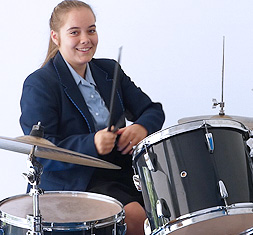 Music's significance in our lives and memories is undeniable. This course is a wonderful opportunity to explore your musical talent and creativity and learn more about something you love. Liverpool's position as a UNESCO City of Music means there's a wealth of musical opportunities for you, personally and professionally. RSL Music is a great option if you love the idea of performing and learning more about the subject, whether for yourself as a hobby or because you aspire to work in that industry.
Music's significance in our lives and memories is undeniable. This course is a wonderful opportunity to explore your musical talent and creativity and learn more about something you love. Liverpool's position as a UNESCO City of Music means there's a wealth of musical opportunities for you, personally and professionally. RSL Music is a great option if you love the idea of performing and learning more about the subject, whether for yourself as a hobby or because you aspire to work in that industry.
How is the course structured & assessed?
This course is continuously assessed, which means students need to work consistently on their chosen instrument/voice and compositional skills throughout years 10 and 11 to achieve their grade. There is no final written exam. Instead, all students perform live to an audience at the end of Year 11.
Unit 1: MUSPRA201ta Musical Knowledge (Internally Assessed)This unit is marked by your teachers and checked by the exam board.
1. Style Report on two contrasting styles of modern music.
2. Track Review: Research, analyse and write about a modern song of your choice,
Unit 2: MUSPRA204ta Instrumental Study (Internally Assessed)
This unit is marked by your teachers and checked by the exam board.
1. On your chosen instrument or voice, design a practice plan, rehearse and keep a diary of your progress.
Unit 3: MUSPRA202ta Live Music Performance (Externally Assessed)
This unit is conducted in controlled conditions and sent to the exam board to mark.
1. Work with other students to plan, rehearse and perform a music show; record your plans and progress and evaluate how well it went at the end.
While extra curricular music, including instrumental or singing tuition, is a compulsory aspect of KS4 Music, prior experience is not essential: many of our students achieve high grades even after starting these in year 10. For anyone concerned about the costs of tuition, free singing or instrument lessons are available to all Music Elective students who need it.
KS4 Homework:
-
Throughout the two year course, students should:
- rehearse their chosen instrument/voice at least 20 minutes a day, 3 times a week;
- attend at least one extra curricular activity to build confidence and performance skill;
- expect to research, revise and report on musical theory and analysis.
Musicians are often rounded, versatile individuals with a wide skill-set. This equips them well for further study and a range of careers, either in performing arts or beyond. Many top-achieving professionals have musical backgrounds. Our KS4 Music students have gone on to succeed in a variety of professional and skilled careers, with a number active in the music industry.
Musical Development
KS4 Music prepares students for:
- BTEC Level 3 in Music / Music Technology
- Level 3 Diplomas, e.g. in Music Performance, Music Technology
All of these Level 3 music qualifications are accepted by universities for a range of courses and subjects.
Studying music, you will gain skills relevant to all career paths: listening, analysis, presentation, communication, creativity, co-ordination, project management, collaborative working, analysis, emotional intelligence...

